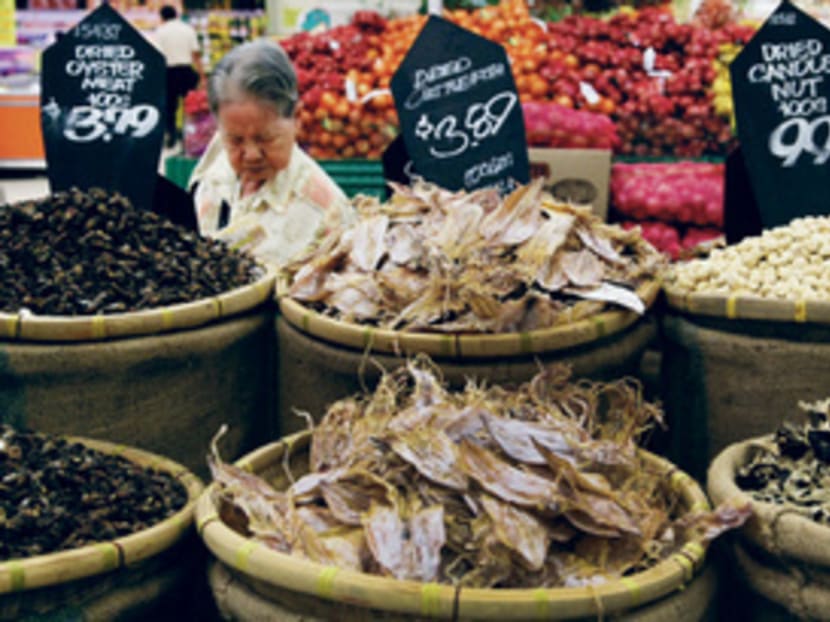S’pore stuck in deflation for third straight month
SINGAPORE — Deflation stalked Singapore for the third consecutive month in January, as tumbling oil prices continued to drag on energy and fuel costs, but analysts said the risk of a prolonged period of negative inflation looks relatively slim.

The MAS and MTI said domestic food inflation could remain elevated in the long term, because of higher prices of regional food supplies. TODAY FILE PHOTO
SINGAPORE — Deflation stalked Singapore for the third consecutive month in January, as tumbling oil prices continued to drag on energy and fuel costs, but analysts said the risk of a prolonged period of negative inflation looks relatively slim.
“This is not a real surprise … The third consecutive month of deflationary figures is due to administrative measures by the Government and the effects of energy prices, rather than a slump in demand or high unemployment causing prices to fall,” said CIMB Research regional economist Song Seng Wun, referring to cooling measures by the Government that have brought down costs of accommodation and private road transport. “Singapore’s labour market is doing all right; it should be less of a concern to any risks of prolonged deflation.”
A revision in the base year for measuring the consumer price index (CPI) to 2014 from 2009 to reflect the latest consumption patterns also altered readings for last year.
The CPI for all items fell 0.4 per cent last month from a year earlier, easing further from a 0.1 per cent drop in December. The slump was slightly more than the median 0.3 per cent fall predicted by economists in a Reuters poll and was also the largest decline since December 2009, when the CPI dipped 0.5 per cent in the wake of the global financial crisis.
The dip last month was due to sharper price declines in direct oil-related items as well as lower food-and-services inflation, the Ministry of Trade and Industry (MTI) and Monetary Authority of Singapore (MAS) said in a joint statement yesterday.
Prices of direct oil-related items were 13.6 per cent lower last month, after falling 7.4 per cent in December, as petrol pump prices and electricity tariffs were cut further following the correction in global oil prices, the statement said. Food prices moderated to 2.2 per cent from 2.7 per cent in December, the data showed, because of the high base in January last year, when costs rose significantly during the Chinese New Year period.
Domestic food inflation could remain elevated in the long term, because of higher prices of regional food supplies, said the MAS and MTI.
“With the Lunar New Year happening in February this year ... we think food prices will likely increase 3 per cent year-on-year when the February CPI report comes out next month,” said UOB economist Francis Tan.
“Households are increasingly affected by higher food costs, especially for fish, seafood and vegetables. While part of the increase in food costs could be due to festive seasons, the disruption in supply from Malaysia plays a part,” said Dr Tan Khay Boon, senior lecturer at SIM Global Education, who also cautioned on the need to expand the Republic’s sources of food supply.
Meanwhile, core inflation — which excludes the costs of accommodation and private road transport — slowed to 1 per cent last month from 1.5 per cent in December, because of a cut in electricity tariffs and a fall in food-and-services inflation.
Looking ahead, the MAS and MTI said in the statement that they expected both core and CPI-All Items inflation to ease further before rising in the second half of the year in tandem with a recovery in oil prices.
In a surprise announcement last month that saw it ease monetary policy and allow the Singapore dollar to appreciate at a slower pace, the MAS revised its inflation forecast for the year to between -0.5 per cent and 0.5 per cent for CPI-All Items inflation, and between 0.5 per cent and 1.5 per cent for core inflation. This is down from its earlier forecasts of 0.5 to 1.5 per cent and 2 to 3 per cent, respectively.
Analysts said they do not expect the MAS to further revise monetary policy before its scheduled policy statement in April. “There is no easing expected by the MAS for April, as it made the revisions last month to stay ahead. April’s policy statement will most likely reiterate the surprise announcement last month,” Mr Song said.






